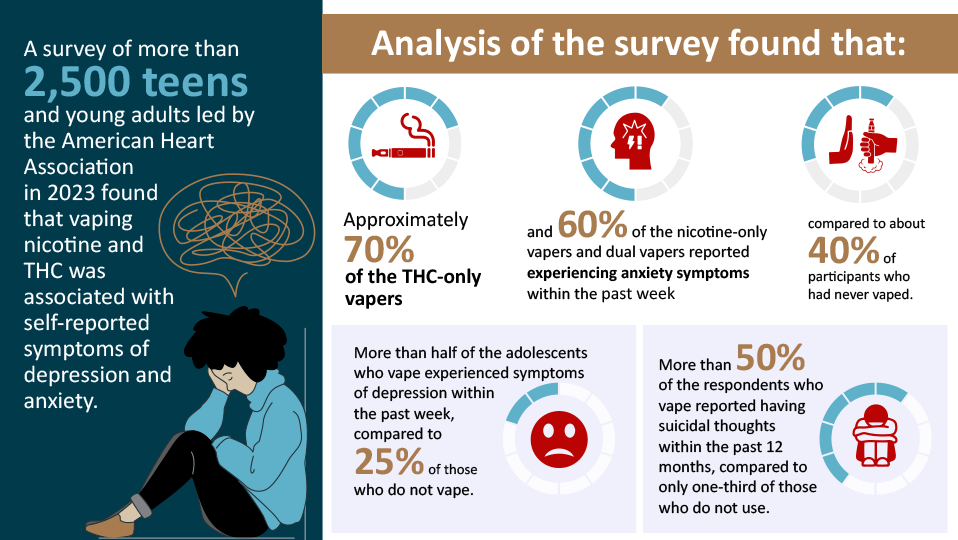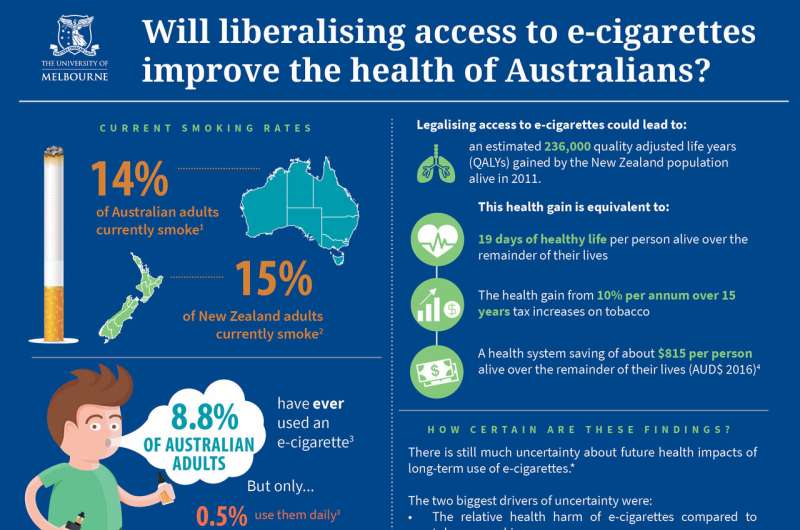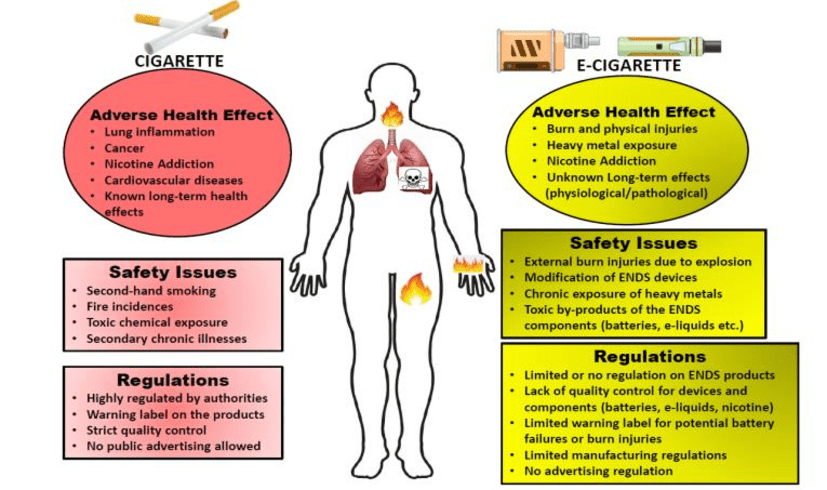Thanks to its possible health advantages and lower dangers, vaping has become a popular alternative to traditional smoking in recent years. The question of whether vaping reduces tension or anxiety is gaining popularity. The scientific data, psychological impacts, and possible dangers of vaping as a stress-reduction method are all covered in detail in this extensive study.
Table of Contents
Understanding Vaping and Its Components
Vaping involves inhaling vapor produced by an electronic cigarette (e-cigarette) or similar device. These devices heat a liquid (commonly called e-liquid or vape juice) that typically contains nicotine, flavorings, and other chemicals. Unlike traditional cigarettes, vaping does not involve burning tobacco, which significantly reduces the intake of harmful substances like tar and carbon monoxide.
Nicotine and Its Effects on the Brain
The main psychoactive component of most e-liquids, nicotine, is a stimulant that has an impact on the reward system of the brain. Nicotine enters the body quickly by inhalation and releases dopamine and serotonin, two neurotransmitters linked to pleasure and happiness. There may be a brief feeling of tension and anxiety reduction following this brief discharge.
Other Ingredients and Their Impact
Besides nicotine, e-liquids may contain various flavorings and additives. Some users opt for CBD-infused e-liquids, which are believed to have calming effects without the psychoactive properties of THC. The impact of these ingredients on anxiety and stress is less documented, but CBD is widely recognized for its potential therapeutic benefits.
Scientific Evidence on Vaping for Anxiety and Stress

Research on Anxiety and Nicotine
There is conflicting research on how nicotine affects stress and anxiety. According to certain research, nicotine’s stimulating effects on the release of neurotransmitters may be able to temporarily relieve feelings of anxiety. Nevertheless, some studies suggest that long-term nicotine usage may raise stress and anxiety levels because of dependency and tolerance building.
CBD and Stress Reduction
Cannabidiol (CBD) has gained attention for its potential to reduce anxiety and stress. Preliminary studies indicate that CBD may have anxiolytic properties, meaning it can help alleviate anxiety. Vaping CBD allows for rapid absorption, potentially providing quick relief. However, more extensive research is needed to fully understand its long-term effects and efficacy.
Psychological and Behavioral Aspects
The act of vaping itself can serve as a coping mechanism for some individuals. The hand-to-mouth action and inhalation process can mimic relaxation techniques, providing a sense of routine and comfort. For those who previously smoked cigarettes, vaping might also reduce stress by satisfying the habitual aspect of smoking without the associated health risks.
Potential Risks and Downsides
Health Risks
Although vaping is thought to be less dangerous than smoking, there are still hazards involved. Respiratory problems may arise from breathing in any foreign materials. Since there is now uncertainty regarding the long-term effects of vaping, care is advised in light of recent worries about lung damage linked to vaping.
Nicotine Dependence
Because nicotine is so addictive, long-term usage can result in dependency. Over time, this addiction may make stress and anxiety worse, particularly if nicotine access is restricted. Withdrawal symptoms in users may include anger, anxiety, and trouble focusing.
Impact on Mental Health
There is evidence to suggest that, while nicotine might offer short-term relief, it could potentially worsen mental health in the long run. Chronic use can lead to changes in brain chemistry, which might increase the susceptibility to anxiety and depression.
Alternative Approaches to Managing Anxiety and Stress
Given the potential risks associated with vaping, it is essential to consider alternative methods for managing anxiety and stress. Here are some scientifically backed strategies:
Therapy and Counseling
Cognitive-behavioral therapy (CBT) and other forms of counseling can provide long-term strategies for managing anxiety and stress. These therapies help individuals identify and change negative thought patterns and behaviors.
Mindfulness and Meditation
Practices such as mindfulness and meditation have been shown to reduce stress and anxiety significantly. These techniques promote relaxation and help individuals stay grounded in the present moment.
Physical Activity
Regular exercise is a proven method for reducing anxiety and stress. Physical activity increases the production of endorphins, which are natural mood lifters.
Healthy Lifestyle Choices
Maintaining a balanced diet, getting adequate sleep, and avoiding excessive alcohol and caffeine can also help manage anxiety and stress levels.
Community and Support Systems
In addition to individual strategies, leveraging community and support systems can be highly effective in managing anxiety and stress. Here are some ways to engage with supportive networks:
Support Teams
Participating in support groups, whether they are online or in person, helps foster understanding and a sense of community. It may be reassuring and illuminating to exchange experiences and coping mechanisms with those going through comparable difficulties.
Friends and Family
It’s essential to establish and preserve solid bonds with family and friends. Speaking honestly about your stress and worry with loved ones might result in both practical guidance and emotional support.
Expert Assistance
Consulting When required, medical specialists like psychologists, psychiatrists, or counselors can offer specialized guidance as well as medicinal measures. Together with therapeutic approaches, these specialists can provide individualized treatment programs that may include necessary medication.
Vaping Regulations and Public Health

Regulatory Landscape
Understanding the regulatory environment surrounding vaping is important for both users and public health advocates. Regulations vary significantly by country and region, affecting the availability, marketing, and composition of vaping products.
Safety Standards
Many countries have implemented safety standards for vaping products to ensure they meet certain quality benchmarks. These standards often include restrictions on harmful substances and accurate labeling of ingredients.
Age Restrictions
To protect younger populations, most jurisdictions enforce age restrictions on the purchase and use of vaping products. These laws are designed to prevent minors from accessing potentially addictive substances.
Public Health Campaigns
Public health campaigns play a crucial role in educating the public about the risks and benefits of vaping. These campaigns often aim to provide balanced information, helping individuals make informed decisions about their health.
Smoking Cessation Programs
Many public health organizations incorporate vaping into smoking cessation programs, recognizing its potential as a harm reduction tool. These programs provide resources and support for those looking to quit smoking by transitioning to vaping or other alternatives.
The Future of Vaping and Mental Health
Ongoing Research
The field of vaping and its effects on mental health is continually evolving. Ongoing research aims to clarify the long-term impacts of vaping, especially concerning anxiety and stress. This research will help shape future guidelines and recommendations.
Innovations in Vaping Technology
Technological advancements in vaping devices are focusing on enhancing safety and user experience. Innovations include temperature control features, better battery safety, and more precise nicotine delivery systems.
Holistic Health Approaches
The integration of vaping within a broader context of holistic health approaches is gaining traction. This perspective emphasizes the importance of addressing mental health through multiple avenues rather than relying solely on vaping.
Practical Tips for Vapers
For those who choose to vape, here are some practical tips to minimize risks and enhance benefits:
Choose Quality Products
Opt for reputable brands that adhere to safety standards. Avoid unregulated or homemade e-liquids, which can contain harmful substances.
Moderate Nicotine Levels
If using nicotine-based e-liquids, start with lower concentrations and gradually adjust based on your needs. High nicotine levels can increase the risk of dependence and adverse effects.
Regular Breaks
Take regular breaks from vaping to prevent the development of dependence. This can also help you assess whether vaping is genuinely alleviating your anxiety or stress.
Stay Informed
Keep up with the latest research and regulatory changes regarding vaping. Being informed helps you make safer choices and understand the potential impacts on your health.
Final Thoughts
While vaping might provide short-term relief for some individuals experiencing anxiety and stress, it is not a panacea. The potential risks, particularly those related to nicotine dependence and long-term health effects, should be carefully weighed. Exploring a variety of coping mechanisms, including professional help and lifestyle changes, offers a more comprehensive approach to managing mental health.
For further insights into improving your overall well-being and mental health, consider exploring resources beyond vaping. A balanced approach, integrating multiple strategies, is often the most effective way to achieve long-term mental health stability.
